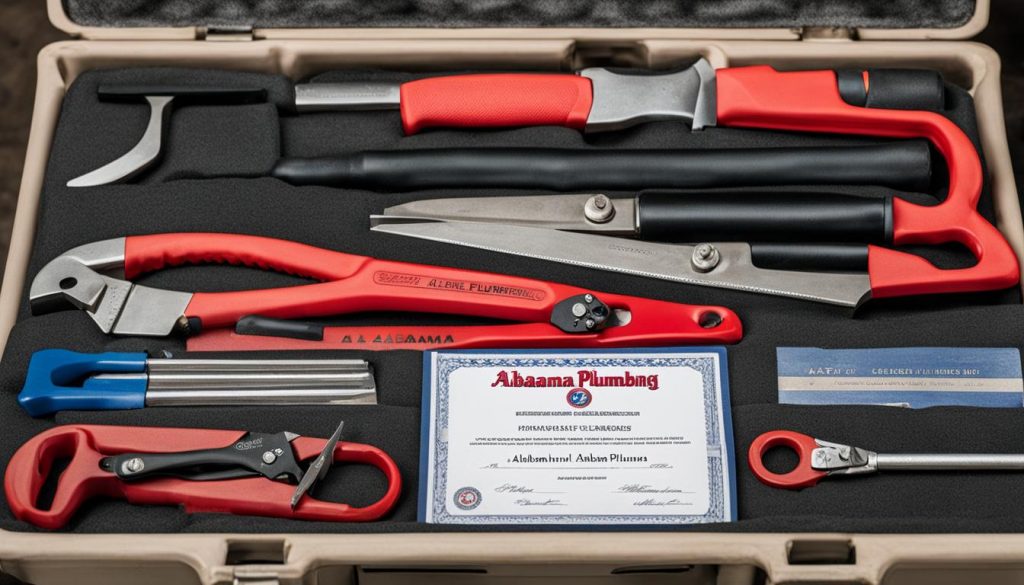States Without Plumbing License Requirements
Did you know that there are some states in the United States that do not require a plumbing license at all? That’s right, in these states, anyone can legally perform plumbing work without any certification or training. This surprising fact raises important questions about plumbing regulations across different states and the potential impact on consumers and the industry as a whole.
Key Takeaways:
- Not all states in the United States require a plumbing license.
- States without plumbing license requirements may have different regulations and standards for plumbing work.
- Obtaining a plumbing license offers various benefits, including job security, higher earning potential, and compliance with local regulations.
- Consumers should be aware of the licensing requirements in their state to ensure they hire qualified and skilled plumbers.
- It is essential to check with the specific jurisdiction to understand the licensing requirements for plumbing work.
Benefits of a Plumbing License
While some states do not require a plumbing license, there are numerous benefits to obtaining one. Being a licensed plumber provides job security, higher earning potential, and the ability to work on a wider range of projects. It also helps build trust with customers and ensures compliance with local plumbing regulations.
The Advantage of Job Security
Obtaining a plumbing license opens up opportunities for long-term job security. Licensed plumbers are in high demand as their expertise is crucial in maintaining and repairing complex plumbing systems. With a license, plumbers can secure stable employment and have confidence in their career prospects.
Higher Earning Potential
A plumbing license can significantly increase earning potential. Licensed plumbers often command higher rates, reflecting their level of skill, knowledge, and experience. With a license, plumbers have the ability to pursue higher-paying jobs, negotiate better compensation, and potentially even start their own plumbing businesses.
Ability to Work on a Wider Range of Projects
By obtaining a plumbing license, professionals expand their scope of work. Licensed plumbers have the expertise to handle a variety of projects, from residential plumbing repairs to large-scale commercial installations. This versatility allows licensed plumbers to take on diverse assignments, ensuring a dynamic and fulfilling career.
Alabama Plumbing License Requirements
In Alabama, aspiring plumbers must fulfill specific licensing requirements set by the Alabama Plumbers & Gas Fitters Examining Board. These requirements aim to ensure that plumbers are skilled and knowledgeable in their field, providing safe and reliable plumbing services.
Apprenticeship and Journeyman License
To qualify for a plumbing license in Alabama, individuals must first complete a two-year apprenticeship program. During this apprenticeship, aspiring plumbers gain valuable hands-on experience under the guidance of experienced professionals. After completing the apprenticeship, individuals must work for an additional year as a journeyman plumber before applying for a license.
Master Plumbers License
Once individuals have obtained their journeyman license, they can apply for a master plumber’s license in Alabama. To be eligible for this advanced certification, plumbers must pass an examination that assesses their knowledge and expertise in various aspects of plumbing.
Becoming a master plumber opens up opportunities for individuals to take on more complex and challenging projects, often leading to greater career advancement and increased earning potential.
Examining Board
The Alabama Plumbers & Gas Fitters Examining Board is responsible for overseeing the licensing process and ensuring that plumbers meet the necessary qualifications. It plays a vital role in regulating the plumbing industry in Alabama and maintaining high standards of professionalism and competency among licensed plumbers.
For more information on the licensing requirements and exams administered by the Alabama Plumbers & Gas Fitters Examining Board, individuals can visit their official website.
| Licensing Level | Requirements |
|---|---|
| Apprentice | Completion of a two-year apprenticeship program |
| Journeyman | At least one year of work experience as a journeyman plumber |
| Master | Passing an examination administered by the Alabama Plumbers & Gas Fitters Examining Board |
Alaska Plumbing License Requirements
In Alaska, obtaining a plumbing license is mandatory, and it is overseen by the Alaska Department of Labor and Workforce Development. The state requires plumbers to meet specific criteria based on the type of license they are pursuing. These licenses include:
Journeyman Plumber License:
To obtain a Journeyman Plumber License in Alaska, individuals must fulfill the following requirements:
- Complete a minimum of 8,000 hours of work experience as a plumbing apprentice, with at least 2,000 of those hours being in the installation of plumbing systems
- Pass the Journeyman Plumber License examination administered by the Alaska Department of Labor and Workforce Development
Plumber Gas Endorsement:
In addition to the Journeyman Plumber License, plumbers in Alaska can pursue a Plumber Gas endorsement. The requirements for the endorsement are:
- Complete a minimum of 2,000 hours of work experience in the installation and repair of gas lines
- Pass the Plumber Gas endorsement examination
Plumber Utility Endorsement:
For plumbers interested in working on utility systems, such as water and sewer lines, Alaska offers a Plumber Utility endorsement. The requirements for this endorsement are:
- Complete a minimum of 8,000 hours of work experience in the installation and repair of utility systems
- Pass the Plumber Utility endorsement examination
Once plumbers meet the necessary requirements, they can apply for their respective licenses through the Alaska Department of Labor and Workforce Development. Obtaining a plumbing license in Alaska ensures that plumbers have the necessary skills and knowledge to perform their jobs effectively and in compliance with state regulations.
| License | Work Experience Required | Examination |
|---|---|---|
| Journeyman Plumber License | 8,000 total hours with 2,000 hours in plumbing systems installation | Yes |
| Plumber Gas Endorsement | 2,000 hours in gas line installation and repair | Yes |
| Plumber Utility Endorsement | 8,000 hours in utility system installation and repair | Yes |
Arizona Plumbing License Requirements
In Arizona, obtaining a plumbing license is a crucial step for those involved in plumbing work valued at more than $1,000. The Arizona Registrar of Contractors is responsible for issuing plumbing licenses for various types of work, including residential and commercial projects.
Having a plumbing license demonstrates your competency and commitment to your profession, ensuring that you meet state requirements and adhere to industry standards. It also provides peace of mind to clients, as they can trust that their plumbing needs will be handled by a qualified professional.
Types of Plumbing Licenses in Arizona
The plumbing license requirements in Arizona vary depending on the specific type of work involved. Some of the common types of licenses include:
- Residential Plumbing License
- Commercial Plumbing License
- Service and Repair Plumbing License
Each license has its own set of criteria that you need to fulfill, such as completing the required education and training, passing an examination, and meeting any additional requirements set by your local jurisdiction. It’s important to consult the Arizona Registrar of Contractors to ensure you understand the specific requirements for the type of plumbing work you wish to pursue.
Additionally, it’s worth noting that certain cities in Arizona may have additional licensing requirements. Therefore, it’s essential to check with the specific jurisdiction where you plan to work to ensure compliance with all local regulations.
Arkansas Plumbing License Requirements
In Arkansas, obtaining a plumbing license is a legal requirement for anyone wishing to work as a plumbing contractor, except when performing work on their own residential properties or agricultural buildings. To become a licensed plumber in Arkansas, individuals are required to follow a specific process outlined by the Arkansas Department of Health.
The first step to becoming a licensed plumber is to register as an apprentice with the Arkansas Department of Health. This registration allows aspiring plumbers to gain practical experience under the guidance of a licensed professional. Apprenticeship programs typically last for four years, during which apprentices will learn the essential skills and knowledge necessary for a successful plumbing career.
After completing the apprenticeship program, individuals can take the next step towards obtaining their plumbing license by accumulating a minimum of four years of work experience. This experience enables plumbers to acquire hands-on expertise in various plumbing tasks and ensures they are well-prepared for the responsibilities that come with being a licensed professional.
Alongside work experience, aspiring plumbers in Arkansas must also pass the required exams to become certified. These exams test their knowledge and understanding of plumbing regulations, codes, and best practices. Successful completion of the exams is crucial for obtaining both journeyman and master plumber licenses, allowing plumbers to work independently on a wide range of plumbing projects.
Obtaining a plumbing license in Arkansas not only ensures compliance with state regulations but also instills confidence in clients. Hiring a licensed plumber guarantees that the work will be carried out by a qualified professional who meets the necessary standards of expertise and safety.
The Importance of Licensing
A plumbing license demonstrates that a plumber has the necessary training and competence to carry out plumbing tasks effectively and reliably. It ensures that plumbers have a comprehensive understanding of building codes, safety regulations, and proper installation techniques. Additionally, having a plumbing license allows professionals to undertake a broader range of projects and increases their earning potential.
California Plumbing License Requirements
In California, obtaining a plumbing license is a crucial step for anyone looking to pursue a career in the plumbing industry. A plumber’s license in California falls under the C-36 Specialty Contractor License, which is issued by the esteemed Contractors State License Board. To meet the requirements for this license, aspiring plumbers must demonstrate four years of journeyman-level experience, successfully pass a comprehensive licensing examination, and fulfill specific educational prerequisites.
The journey towards obtaining a California plumbing license begins with gaining the necessary experience. Aspiring plumbers must accumulate four years of on-the-job experience at the journeyman level. This experience is typically obtained through apprenticeship programs or through working under the supervision of a licensed plumber. It is important to note that every county in California may have additional licensure requirements that should be carefully reviewed and followed to ensure compliance.
Once the required experience is obtained, aspiring plumbers must pass a rigorous licensing examination administered by the Contractors State License Board. The examination evaluates individuals on their knowledge of plumbing codes, regulations, practices, and safety procedures. It is essential to thoroughly prepare for this examination to increase the chances of success.
In addition to the experience and examination, California has certain education requirements that must be met to obtain a plumbing license. These requirements may include completing courses in plumbing, construction, or related fields. It is advisable to consult the Contractors State License Board or seek guidance from established professionals in the field to ensure compliance with these educational prerequisites.
Overall, obtaining a plumbing license in California is a multi-step process that involves building experience, passing a licensing examination, and meeting specific educational requirements. It is important for aspiring plumbers to familiarize themselves with the California Contractors State License Board and understand the additional licensure requirements of their specific county. By fulfilling all the necessary prerequisites, individuals can confidently pursue their career in the plumbing industry in California.
Source Links
- https://www.servicetitan.com/blog/plumbing-license-requirements
- https://www.gosite.com/blog/how-get-plumber-license-united-states-by-state
- https://www.nextinsurance.com/blog/plumber-licensing-requirements/
- Investing Wisely: How Windows & Doors in Boost Property Value and Financial Health - April 24, 2025
- The Financial Impact of Personal Injuries: Why Legal Help Matters for Business Owners - April 16, 2025
- The Hidden Financial Costs of Domestic Assault: What Business Owners Need to Know - April 16, 2025













